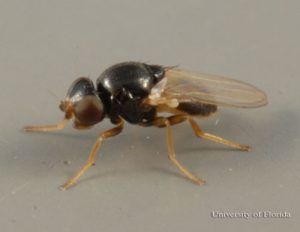If you’ve been outside this spring, you’ve probably been bothered by gnats. These tiny flies relentlessly congregate near the face getting into the eyes, nose, mouth and ears.
Eye gnats come right up to the faces of people and animals because they feed on fluids secreted by the eyes, nose and ears. Even though eye gnats are considered mostly a nuisance, they have been connected to transmission of several diseases, including pink eye.
Eye gnats are true flies. At about one-sixteenth of an inch in length, they are among the smallest fly species in Florida. They are known as eye gnats, eye flies, frit flies and grass flies. The name grass flies is somewhat descriptive as open grass areas such as pastures, hay fields, roadsides and lawns provide breeding sites for these gnats. They also breed in areas of freshly disturbed soil with adequate organic matter such as livestock farms.
Even though these gnats can be found in much of North and South America, they prefer areas with warm, wet weather and sandy soils. Sounds like Florida.
The lack of cold weather in late winter and early spring is the more likely reason for why these gnats are such a problem in our area this year. Without having the typical last killing frost around mid-March and with early warm weather and rains, the gnats got off to an early start.
Short of constantly swatting them away from your face or just not going outdoors, what can be done about these irritating little flies?
By the way, I grew up in an area of Georgia where gnats are common. I’ll let you in on a secret… Folks who live in Georgia are known to be overly friendly because they are always waving at people who are just passing through. More than likely, these “friendly” folks are busy swatting at gnats, not waving at others who happen to be driving by. Swatting is a quick swinging action with hand as if waving.
Because of their life cycle, extremely high reproductive numbers in the soil and because insecticides breakdown quickly, area-wide chemical control efforts don’t work well in combating this insect.
The use of the following where gnats are common can be helpful.
- Correct use of insect repellents, particularly those containing DEET
- Screens on windows to prevent entry of gnats into homes
- Face-hugging sunglasses or other protective eyewear
- Face masks – another use for your COVID-19 face mask
We may have to put up with these annoying gnats until cold weather arrives and be thankful that they don’t bite.
Additional info on eye gnats is available online at https://edis.ifas.ufl.edu/in884 or from the UF/IFAS Extension Office in your County.
- Know What You’re Doing when Amending Florida’s Sandy Soil - December 18, 2025
- Evaluate and Renovate Landscape During Fall - October 30, 2025
- Summer is Too Hot for Lawn Herbicides - August 23, 2025

